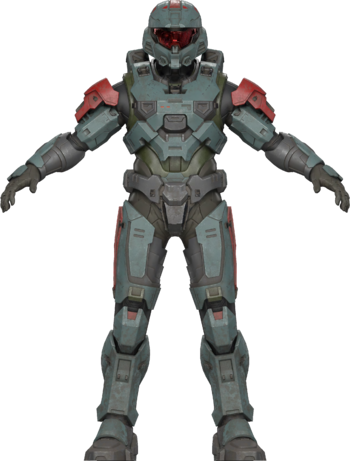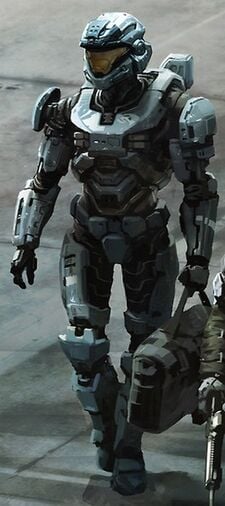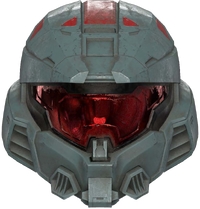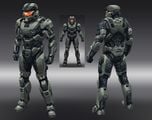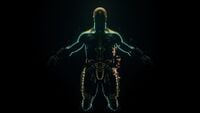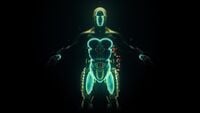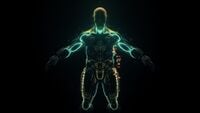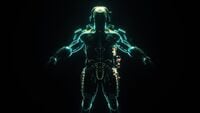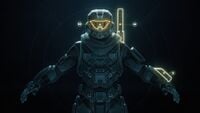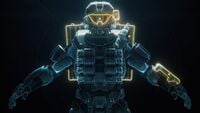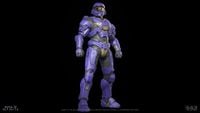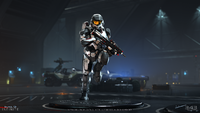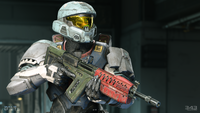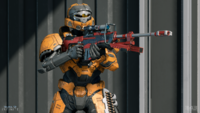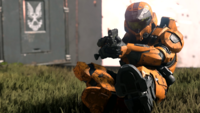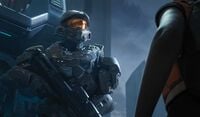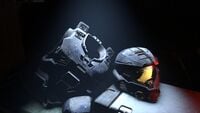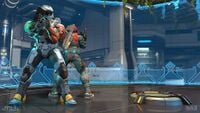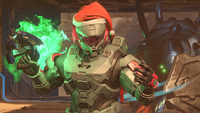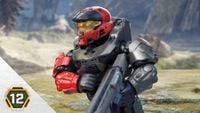MJOLNIR Powered Assault Armor/Mark VII
From Halopedia, the Halo wiki
| MJOLNIR Powered Assault Armor/Mark VII | |
|---|---|
| Production overview | |
|
Manufacturer(s): |
|
|
Type: |
|
|
Role(s): |
Prototype-components testbed for future MJOLNIR iterations |
| Technical specifications | |
|
Feature(s): |
|
The MJOLNIR Powered Assault Armor/Mark VII is the fourth and most recent major iteration of the MJOLNIR Powered Assault Armor [GEN1]. The armor's cost led it to be supplanted by the MJOLNIR [GEN2] line.[3] GEN1 Mark VII was issued to at least one of the surviving Spartan-II supersoldiers, Naomi-010, on January 27, 2553.[4] However, ONI's Materials Group had not given up on Mark VII. With designs created as part of Misriah Armory's Project KEYSTONE, Materials Group would finally manufacture a full production run of the armor as part of the MJOLNIR [GEN3] line circa 2559.[5]
Variants and development history[edit]
- Main article: MJOLNIR Powered Assault Armor (GEN3)
Hypothetical model (2535)[edit]
Theoretical design elements for a seventh iteration of MJOLNIR were proposed by Doctor Catherine Halsey in her personal journal in 2535; how many of these features were implemented in the final product is unknown. The Mark VII appeared to have been the last planned phase of the MJOLNIR project at the time. It would have utilized a power system that made use of a combination of plasma and fusion technology, slipspace de-insertion capability, active AI transfer protocols, and limited shaping of the suit's energy shield.[6]
"Slipspace de-insertion capability" means that a Spartan would be able to exit a vessel traveling in slipspace and re-enter normal space, similar to the Long range stealth orbital drop pod. Halsey described "limited shaping of the energy shield" as the ability to form "partial overlaps, airfoils, etc."[6] This incidentally would have been quite similar to the Forerunners' practice of shaping hard light.
Due to unexpected technological breakthroughs, some of these upgrades were implemented earlier than planned and are presumably featured in the production version of the Mark VII. For example, the Mark VI has integrated atmospheric insertion capabilities, which allow a Spartan to free-fall from space without a re-entry vehicle such as an SOEIV. However, this requires a drag chute or parachute,[7] whereas the theoretical Mark VII would have all necessary technology integrated into the suit.[6]
GEN1[edit]
The Mark VII was produced by a supplier other than Office of Naval Intelligence's Materials Group, which produced the previous models. It is more lightweight than prior versions.[4] The Mark VII implements several features not exhibited by earlier MJOLNIR incarnations. Most notably, the armor contains nano-technological components which enable the armor to repair and upgrade itself autonomously without outside influences, such as while the user is in cryosleep.[8] The Mark VII also features limited energy shield shaping.[9] Naomi-010's Mark VII suit resembles the Mark V[B],[10] which may be due to the Spartan's choice in her armor's appearance.[11] The Mark VII also is able to recycle urine; this is done with precise calibration on a catheterized Spartan.[12]
GEN2[edit]
The Mark VII platform saw some amount of iteration on the GEN2 platform of MJOLNIR development, though proved to be cost-ineffective to mass-produce and was never manufactured in large numbers. In light of the development of the more versatile GEN2 platform which enabled more economical optimization for the different Spartan generations in service, the first generation MJOLNIR was mainly optimized for the Spartan-IIs.[9] The closest GEN2 variant to the Mark VII is the DECIMATOR armor, though it is mostly unknown outside of the Spartan special forces community.[3]
GEN3[edit]
By October 2558, the Mark VII was used as the testbed for the MJOLNIR Powered Assault Armor (GEN3), but it remained uncertain if manufacturers would adopt the standards and cost accounting by the Unified Earth Government.[13] Eventually, the efforts of the Mark VII and DECIMATOR programs alongside similar projects within the Materials Group would dovetail, resulting in the GEN3 Mark VII variant. Design of this armor was selected by Dr. Halsey from Materials Group's KEYSTONE development program. This suit is designed to outfit the latest Spartan contingents with the very best in cutting-edge warfighting technology.[5]
This armor was worn by Spartan Hudson Griffin, a member of Fireteam Taurus, during the events of the Battle for Zeta Halo. Griffin employed the UA/Agathius shoulder pads and Walle gloves. It was forcibly stripped from Griffin while he was in captivity at Chak 'Lok's Tower. Chak 'Lok subsequently used the armor's distress beacon to lure John-117 into a trap, but he was killed by the Master Chief who took the Threat Sensor from Griffin's armor and incorporated it into his own GEN3 Mark VI armor.[14] Spartan Bonita Stone,[15] Vedrana Makovich, and Theodore Sorel[16] used Mark VII armor as well, with Stone employing the Trailblazer helmet, the UA/Agathius shoulder pads, and UA/Type SA knee pads,[15] Makovich employing the Zvezda helmet, UA/Agathius shoulder pads, and UA/Type SA knee pads, and Sorel employing the ISR helmet, UA/Agathius shoulder pads, and UA/Type SA knee pads.[16] At some point before January 24, 2560, Makovich had her armor's motion sensor replaced, and took the last one in the UNSC Mortal Reverie's storage which prevented Stone from replacing her own damaged motion sensor,[17] having lost both it and her targeting sensors early in the battle.[18] After finding their bodies, John-117 inherited Stone's enhanced energy shielding module[15] which she had acquired during Stone's time on Zeta Halo,[19] Makovich's drop wall module and Sorel's thruster pack module which he would then incorporate into his own Mark VI armor.[15][16]
During the same battle, Spartan Tomas Horvath wore GEN3 Mark VII armor equipped with the Anubis helmet, UA/Castus shoulder pads, and UA/Type SA knee pads.[20] Spartan Nina Kovan used GEN3 Mark VII armor employing the Stormfall helmet, the UA/Faunus shoulder pads, and UA/Type SA knee pads.[20] Both suits of armor suffered heavy damage over the course of the months-long battle, during which time neither Spartan had access to the tools required to make proper repairs to them. Horvath and Kovan's armor suffered various system failures due to accumulated battle damage, although their continued functionality acted as a testament to how durable the GEN3 Mark VII armor was.[21] Before arriving at the Mortal Reverie, Kovan was left with a bad shield sensor that she couldn't get repaired.[17] By April 18, Kovan's long-range comms and AI were fried from a shock rifle hit, her short-range comms only connected half of the time and her density regulator was malfunctioning.[22] Horvath lost his motion tracker, armor camouflage and long-range communications early on[23] and his ID sensor at some point.[22] After being severely wounded by the impalement of an alloy shard between his intestines and spleen, Horvath's biomonitors kept him in a semicomatose state while the armor's medical systems regenerated his torn insides, and the armor kept him alive until he could hunt for food using its emergency high-calorie nutrient supplements.[24] Horvath's damaged armor, combined with his augmentations, kept the Spartan from dying of exposure while he was comatose for a day on a mountain side. However, the state of his failing armor at this point caused Horvath to consider abandoning it before it completely shut down and trapped him, an idea that Horvath dismissed each time.[25] When Horvath came to Echo 216's rescue approximately two weeks later, his armor was described as having obviously been through hell.[26] John-117 later gave his threat sensor, grappleshot and a spare overshield module to Horvath while Joyeuse managed to repair Horvath's motion sensor and patched what she could of his BIOS.[27] With the help of Erik Bender and Robin Dimik, Kovan effected some repairs on her own armor by removing and reconfiguring some of the plating to compensate for the damage, but the sheer weight of each piece and the complexity of the process was a severe limitation without the right equipment.[28] Kovan ultimately ditched most of her armor aside from her fusion reactor and malfunctioning helmet in favor of a patchwork of salvaged Spartan and ODST armor.[29]
Design details[edit]
Though the GEN3 model of Mark VII Mjolnir does represent a generational leap for the Mjolnir platform for actively deployed Spartans, some elements tested with the GEN1 and GEN2 Mark VII remain in the prototype stage due to unreliability or cost factors, such as integration of Forerunner-derived nanomachine elements and full shield-shaping.[5]
The majority of GEN3 Mark VII armor is made out of a titanium alloy.[30] Its helmet features large, high-end air intakes on each side of the visor. Combined with robust filtration systems, these keep Spartans operating smoothly within the hostile air of alien worlds and in crowded urban environments alike. Spartans have the option of attaching two supplemental vents below the visor for improved breathability.[31] The Mark VII chest piece is compatible with a wide range of attachments and enhancements that can be tailored to specific mission parameters.[32] Similarly, the techsuit can also be easily customized. For the purpose of attaching shoulder and bicep armor, Mark VII armor includes a mounting pauldron that is connected directly to the techsuit.[33][34] As with previous iterations of Mjolnir armor, Mark VII forearms support attachments such as TACPADs.[35] The gloves used with Mark VII armor—as well as any set of GEN3 Mjolnir—make use of enhanced nano-papillary cells to provide strong grip and surface friction, which is ideal when coming into frequent contact with incredibly smooth alien alloys. The gloves also provide protection in hazardous environments while remaining flexible enough to allow for maximum mobility, particularly for the trigger finger.[36] As with virtually all other iterations of Mjolnir, the overlapping thigh armor plates include weapon mounts for pistol-sized firearms.[37] The shin guards on Mark VII Mjolnir are composed of two separate plates (front and back), which are connected using high-strength buckles.[30] Mark VII's foot armor sits atop a form-fitting “bootie” made of a similar composite-polymer material as the techsuit. The underside of the boots feature a highly specialized tread pattern that provides optimal grip in a wide range of environments, designed to provide adequate friction for launching an attack. When necessary, electromagnetic resonance amplifiers can be engaged to provide additional stability.[38]
Similar to the GEN3 Mark VI armor,[39] the GEN3 Mark VII appears to contain a survival mode that keep its user alive under extreme conditions.[24][25] This includes medical systems that, over the course of a week or so, can regenerate severe but not immediately lethal impalement wounds while keeping the occupant semicomatose.[24]
In-game information[edit]
Halo 4[edit]
As part of Series 7: Elite for Halo: The Master Chief Collection, a helmet based on the Mark VII design featured in Halo Infinite is available for use. While visually similar, this helmet is known as the Keystone helmet.[40]
| Armor | Description | Unlock requirements (Halo 4) |
Unlock requirements (Halo: MCC) |
|---|---|---|---|
Keystone |
Description (MCC): Materials Group evolutionary design that eventually formed the basis of the production Mk. VII. | N/A (MCC-exclusive) | Series 7: Elite, Purchase in The Exchange ( |
Halo Infinite[edit]
The Mark VII armor core is the default armor core unlocked for all players in Halo Infinite multiplayer. The Mark VII helmet and its attachments are available for multiplayer Spartan armor customization on the Mark VII armor core.
| Armor | Manufacturer | Lore | Rarity | Unlock Requirements |
|---|---|---|---|---|
Mark VII armor core |
Materials Group | Created with input from Dr. Halsey herself, the latest MARK VII iteration refreshes the Mjolnir technical architecture with breakthroughs in neural interfaces, shield emitters, fusion power, and armor formulation.[Note 1] | Common[Note 2] | Unlocked by default |
Mark VII |
Materials Group | Created with input from Dr. Halsey herself, the latest MARK VII iteration refreshes the Mjolnir technical architecture with breakthroughs in neural interfaces, shield emitters, fusion power, and armor formulation. | Legendary | Season 01: Heroes of Reach Battle Pass level 96 (Free) |
Attachments[edit]
- Calling Card
- CNM(5)/BNR/FASCINATOR
- Flower Power
- HUL[4X]/ENIT/WITCHBRAND
- HUL-I/LIGHTSPIKE
- HUL-I/RS/FACELIFT
- HUL-I/RS(2)/VENONA
- Needle Minder
- Purrfect Audio
- Rein Supreme
- RS[3]/LOCKSTEP
- Silent Nightcap
- Tines of Respect
- TAS/NETMOON
- UA/ARMET
Production notes[edit]
Both the Keystone helmet in Halo: The Master Chief Collection and the Mark VII armor in Halo Infinite are called Olympus in the games' files.[41][42]
Gallery[edit]

|
Browse more images in this article's gallery page. |
Concept art and illustrations[edit]
Naomi-010 in her GEN1 Mark VII armor in Halo: The Thursday War.
Concept exploration of a Mark VII "RECON" loadout with several kinds of placeholder equipment.
Screenshots[edit]
GEN3 Mark VII with UA/Agathius shoulders employing the Monarch armor coating in Halo Infinite.
A Spartan-IV wearing GEN3 Mark VII and wielding an Mk50 Sidekick.
A Spartan in Mark VII in the Halo Infinite Tutorial.
A close-up look at Hudson Griffin's Mark VII armor in Chak 'Lok's tower.
A Mark VII-clad Spartan-IV alongside a Rakshasa-clad Spartan-IV in promotional content for Season 02: Lone Wolves.
A Mark VII helmet with the Silent Nightcap attachment, promoting the Winter Contingency II event.
A Mark VII-clad Spartan-IV with an overcharged Rohakadu-pattern plasma pistol.
Merchandise[edit]
List of appearances[edit]
- Halo 3 (Mentioned in Halo: The Master Chief Collection only)
- Halo: Reach
- Dr. Halsey's personal journal (First mentioned)
- Halo: Glasslands (First appearance)
- Halo: The Thursday War
- Halo 4 (Mentioned in Halo: The Master Chief Collection only)
- Halo: Mortal Dictata
- Halo 5: Guardians (Mentioned only)
- Halo Mythos
- Halo: Official Spartan Field Manual (Mentioned only)
- Halo Infinite
- Halo: The Third Life
- Halo: Flashpoint
- Halo: Edge of Dawn
Notes[edit]
Sources[edit]
- ^ Halo Waypoint, Canon Fodder - Despite Distance
- ^ Halo Infinite, Armor Hall: Mark VII - Helmet Description "Created with input from Dr. Halsey herself, the latest MARK VII iteration refreshes the Mjolnir technical architecture with breakthroughs in neural interfaces, shield emitters, fusion power, and armor formulation."
- ^ a b Halo Waypoint, Canon Fodder - Reqlamation Begins
- ^ a b Halo: Glasslands, page 291
- ^ a b c Halo Waypoint, Canon Fodder - Despite Distance (Retrieved on Jun 1, 2020) [archive]
- ^ a b c Dr. Halsey's personal journal: January 7, 2535
- ^ Halo Graphic Novel - Armor Testing
- ^ Halo: Glasslands, page 213
- ^ a b Halo Waypoint, MJOLNIR
- ^ Halo: The Thursday War: cover art
- ^ Halo: The Thursday War, page 174
- ^ Halo: Glasslands, page 212
- ^ Halo: Official Spartan Field Manual, page 179
- ^ Halo Infinite, campaign level The Tower
- ^ a b c d Halo Infinite, campaign level Foundation
- ^ a b c Halo Infinite, campaign level Conservatory
- ^ a b Halo: The Rubicon Protocol, chapter 14
- ^ Halo: The Rubicon Protocol, chapter 7
- ^ Halo: The Rubicon Protocol, chapter 26
- ^ a b Halo: The Rubicon Protocol, cover art
- ^ Halo: The Rubicon Protocol
- ^ a b Halo: The Rubicon Protocol, chapter 24
- ^ Halo: The Rubicon Protocol, chapter 4
- ^ a b c Halo: The Rubicon Protocol, chapter 22
- ^ a b Halo: The Rubicon Protocol, chapter 39
- ^ Halo: Edge of Dawn, chapter 14
- ^ Halo: Edge of Dawn, chapter 15
- ^ Halo: The Rubicon Protocol, chapter 38
- ^ Halo: Edge of Dawn, chapter 42
- ^ a b Halo Waypoint, Official Cosplay Guide: Mark VII: Page 90 (Retrieved on Jun 18, 2021) [archive]
- ^ Halo Waypoint, Official Cosplay Guide: Mark VII: Page 16 (Retrieved on Jun 18, 2021) [archive]
- ^ Halo Waypoint, Official Cosplay Guide: Mark VII: Page 27 (Retrieved on Jun 18, 2021) [archive]
- ^ Halo Waypoint, Official Cosplay Guide: Mark VII: Page 34 (Retrieved on Jun 18, 2021) [archive]
- ^ Halo Waypoint, Official Cosplay Guide: Mark VII: Page 41 (Retrieved on Jun 18, 2021) [archive]
- ^ Halo Waypoint, Official Cosplay Guide: Mark VII: Page 48 (Retrieved on Jun 18, 2021) [archive]
- ^ Halo Waypoint, Official Cosplay Guide: Mark VII: Page 55 (Retrieved on Jun 18, 2021) [archive]
- ^ Halo Waypoint, Official Cosplay Guide: Mark VII: Page 76 (Retrieved on Jun 18, 2021) [archive]
- ^ Halo Waypoint, Official Cosplay Guide: Mark VII: Page 97 (Retrieved on Jun 18, 2021) [archive]
- ^ Halo Infinite, campaign mission Ringfall: Warship Gbraakon
- ^ Twitter, Halo (@Halo): "Make sure it fits just right. Next week in MCC with the arrival of Season 7, don't miss your chance to grab the #HaloInfinite Inspired Mk. VII Helmet for Halo 4." (Retrieved on Jun 17, 2021) [archive]
- ^ Halo: The Master Chief Collection
- ^ Halo Infinite
| |||||||||||||||||||||||||||||||||||||||||||||||||||||||||||||||||
| ||||||||||||||||||||||||||||||||||||||||||||||||||||||||||||||||||||||||||||||||||||||||
